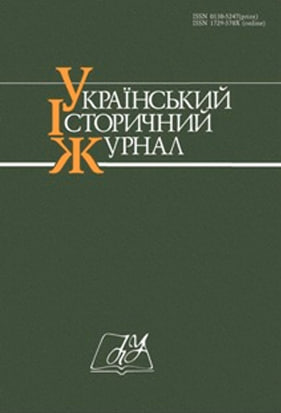Divorce in the Families of Ukrainians in Halychyna in the 1920–1930s (Based on the Cases of the Court of the Lviv Greek-Catholic Metropolitan Consistory)
DOI:
https://doi.org/10.15407/uhj2022.06.098Keywords:
Halychyna, Ukrainians, divorce, marital and family relations, marriage, familyAbstract
The purpose of the study is to uncover the main reasons/motives for seeking divorce among the Ukrainians in Halychyna in the 1920–1930 s, based on the analysis of the records of the court of the Lviv Greek-Catholic Metropolitan Consistory.
The research methodology is based on the principle of historicism, as well as on general scientific and specific scientific methods, primarily the comparative-historical method. Priority was given to the study of archival documents and ethnographic literature which made it possible to analyze and compare data related to marriage and family dating back to the early 20th century with the data of the 19th century.
The scientific novelty of the study lies in the fact that the motives and reasons for the Ukrainians seeking divorce in Halychyna in the 1920–1930 s have been analyzed on the basis of elaborated archival court cases for the first time in the Ukrainian historical science. The factual materials and theoretical generalizations presented in the article are important for understanding the socio-economic and socio-political realities inherent in the then rural society.
Conclusions. Going through the divorce, the Ukrainian peasants of Halychyna were guided by various motives and reasons, relying mainly on the canonical requirements of the Ukrainian Greek Catholic Church and the law of custom. Among the main reasons for the family discord or marriage annulment in the interwar period were canonical ones, i.e. forced marriage, marriage between close relatives, bigamy, irregularity in the wedding ceremony (including non-Greek Catholic rite), formal termination of marriage to legitimize the long-standing “wild spouse”. Other common reasons included immoral behavior, mental or physical illness, abuse, threats from a spouse, assault and battery. At the same time, adultery was not considered in rural areas a good reason to terminate the marriage. All these reasons were brought to the foreground in the context of emigration and wartime, when the separation of husbands and wives had lasted for years. In fact, by petitioning the ecclesiastical court to declare the missing members dead and to terminate the marriage, the suers wanted to arrange their personal life in a new way, guided by both practical considerations and emotional factors. That is why in archival documents most of the cases concern petitions for the termination of a marriage due to the death of one of the spouses and the legalization of the marriage “in faith” (unregistered marriage). The political motives for divorce were singled out as well, since such circumstances as the absence of the state, occupation of Halychyna by Poland, establishment of the Soviet regime in other Ukrainian lands became the basis for arrests, denunciations, political betrayals, fidelity tests and, eventually, divorces.


